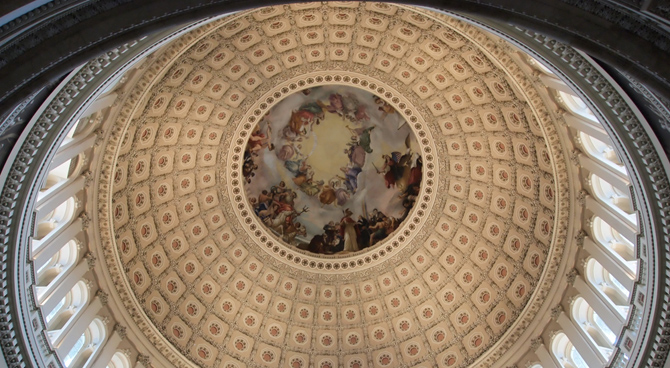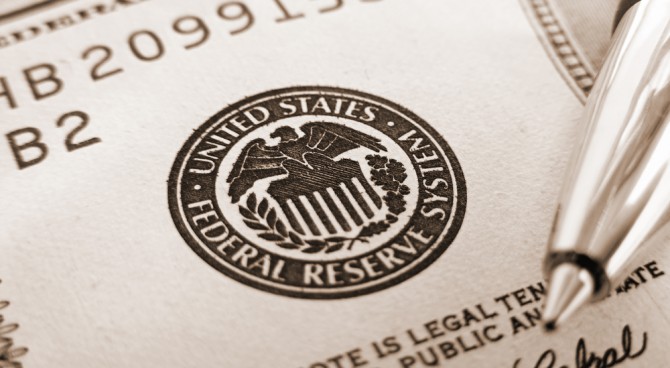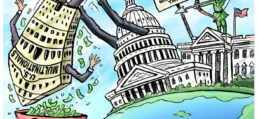Biden is holding Congress hostage: Impose the levy, or see foreign nations seize American profit anyway.
April 6, 2023 6:34 pm ET
The Biden administration wants to make the world safer for tax increases. That’s the message the White House has sent by enjoining the Organization for Economic Cooperation and Development to agree on a new global levy. The proposal, thus far endorsed by 137 nations, imposes a 15% global minimum tax on multinational corporations with sales of over €750 million and a profits tax levied where sales are made—not where profits are reported—on companies with over $20 billion of revenue.
It isn’t difficult to figure out who would bear the brunt of this economic burden. Neither tax is calculated to include the amortization of intellectual property, and both would primarily hit American corporations, which are bigger and more profitable and own more intellectual property than their international competitors. Though a Democratic Congress rejected the tax last year, President Biden has now spearheaded the international agreement to let foreign nations tax American companies to collect the equivalent of the tax on their U.S. earnings if Congress won’t impose the tax.
The 2017 tax cut lowered America’s federal corporate tax rate from 35%, the OECD’s highest rate, to 21% in what the OECD director then described as a “race to the average.” With state corporate taxes added, the average combined U.S. rate is now 25%, slightly above the global mean of 23%. The economy grew 2.9% in 2018, the strongest growth rate in 13 years, and almost certainly would have broken 3% had the Trump administration not launched a trade war that year, which the Congressional Budget Office estimated would cost the economy some half a percentage point of economic growth.
Since corporations are nothing but legal structures, no one has ever seriously disputed the notion that corporations don’t pay taxes. If a corporation can’t pass a tax on to customers, the burden will fall on investors and workers. As expected, after the 2017 tax cuts went into effect, real wages grew 43% more in 2018 and 93% more in 2019 than the 2011-17 average increase.
Pension and mutual funds, charitable organizations and insurance companies holding equities to fund death and annuity benefits—which own some 72% of all American equities—saw their rate of return increase 22% relative to the average 2011-17 returns in the two years following the tax cuts before the pandemic. After the 2016 elections, when it became clear a tax cut was coming, until the beginning of the pandemic, equity values rose twice as fast annually as they had risen during the previous seven years. A corporate-tax increase would be expected to produce the opposite results.
When Mr. Biden took office he proposed a massive corporate-tax increase of $1.9 trillion—four times the estimated cost of the 2017 corporate-tax cuts. But the Democratic Congress rejected the proposal and adopted a dramatically smaller corporate-tax increase that raised only a fifth of the revenue set out in the president’s plan. Now facing a Republican House, the Biden administration’s only hope of raising corporate taxes is by using the OECD agreement to pressure Congress to impose the tax or see those nations that do adopt the corporate minimum tax impose additional taxes on subsidiaries of U.S. companies effectively to collect the minimum tax on their U.S. earnings. The global minimum tax is conveniently set to go into effect in 2025, after the elections and when many popular provisions of the 2017 tax cut expire.
The OECD minimum-tax agreement is estimated to collect some $236 billion in new taxes and redistribute some $200 billion of tax collections by allocating taxing authority based on where sales occur, not where profits are reported. Despite the OECD’s decade of work on the tax, the organization along with the Treasury Department claims not to know how much of this tax will be paid by U.S. companies—or, more precisely, by American investors, workers and consumers.
But the answer seems obvious since only two of the 25 top tech companies and two of the top 25 Fortune 2000 companies are based in Europe, while 18 and 13 are based in the U.S., respectively. Denying amortization of intellectual property, allocating taxing authority based on where sales are made, and imposing what amounts to an excess profits tax on very large, highly profitable companies guarantees that American companies will pay most of the tax in virtually every nation in the world where the tax is collected. The Oxford Center for Business Taxation has estimated the U.S. will pay 64% of the profits tax, compared with 9.5% for China, 3.8% for the U.K., 1.6% for Germany and 0.7% for France. Based on all available evidence it appears the burden of the corporate-minimum-tax provision will also fall primarily on U.S. corporations.
Taxing nonvoters is government’s oldest game. Yet this time the European Union, which dominates the OECD, is playing it with a willing American partner. It’s easy to understand why other countries are willing to agree to an international tax system in which Americans pay most of the taxes. But the White House’s championing of the tax reveals how committed the administration is to pushing big government everywhere and how desperate it is to raise U.S. corporate taxes.
Republicans can’t afford to stand by and let the Biden administration use an international agreement that the American people’s representatives never approved to pressure Congress to raise taxes on investors, workers and consumers. This blatant misuse of executive power cries out for Congress to repudiate the international agreement, mandate a retaliatory response to any effort by foreign nations to collect the tax on U.S. earnings, and terminate U.S. funding for the OECD until the minimum tax agreement is vitiated.
If the Biden administration can conspire with European nations to raise U.S. taxes, how long will it be before the same process imposes European environmental and regulatory policy on the U.S.? The recently exposed Federal Trade Commission “coordination” with European regulators to kill mergers that the U.S. courts wouldn’t allow the agency to stop suggests it won’t be long.
Mr. Gramm is a former chairman of the Senate Banking Committee and a nonresident senior fellow at American Enterprise Institute. Mr. Solon is an adviser of US Policy Metrics.





